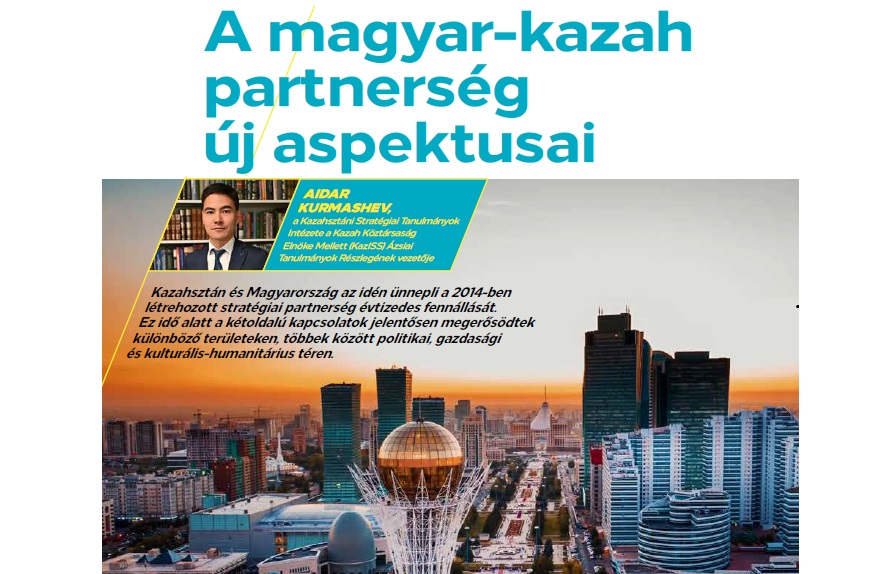An article by Aidar Kurmashev, Head of the Asian Studies Department at the Kazakhstan Institute for Strategic Studies under the President of Kazakhstan (KazISS), dedicated to the partnership between Kazakhstan and Hungary in culture, education, and expert collaboration, has been published in the Hungarian socio-political journal EURAZSIA. Below is the full text of the article.
Kazakhstan and Hungary: A Decade of Strategic Partnership
In 2024, Kazakhstan and Hungary celebrate the 10th anniversary of their strategic partnership, established in 2014. Over this period, bilateral relations have significantly strengthened across various fields, including politics, economics, and cultural-humanitarian cooperation.
Today, these ties go beyond traditional diplomatic exchanges, becoming part of a deeper process of integration and cultural renaissance, connecting the peoples of the two nations through their shared Turkic heritage.
Culture and Sports
In 2024, Kazakhstan hosted the World Nomad Games—a major international event that brought together athletes and spectators from around the globe. This event not only showcased the richness of nomadic cultural heritage but also symbolized the growing cultural exchange and Kazakhstan’s rising profile on the global stage.
The shared cultural identity creates new opportunities for partnerships, including with Hungary, which, as a member of the Organization of Turkic States, actively supports such initiatives. Hungary sent a delegation of 47 athletes to the event in Astana[1].
Education and Science
Another area of cooperation between Kazakhstan and Hungary is education, where significant progress has already been achieved. Kazakhstani and Hungarian students have the opportunity to participate in exchange programs at leading universities in both countries, fostering mutual understanding and knowledge sharing.
Under the Agreement between the Ministry of Education and Science of Kazakhstan and the Ministry of Human Resources of Hungary, 250 scholarships are awarded annually through the Stipendium Hungaricum program[2].
These programs not only facilitate knowledge exchange but also lay the foundation for preparing future strategic partners. Kazakhstani students studying in Hungary gain valuable skills and connections that can contribute to forming future elites oriented toward cooperation with Europe and the Turkic world.
Expert Collaboration
Expert-analytical cooperation between Kazakhstan and Hungary has become one of the key areas of partnership, enabling both nations to strengthen their positions in the international analytical and scientific community.
Think tanks from Kazakhstan and Hungary, including KazISS and the Hungarian Institute for International Affairs, engage in bilateral and multilateral expert meetings. These events cover a wide range of topics—from regional security to sustainable economic development. Such initiatives create essential platforms for dialogue and knowledge exchange, bringing experts together to develop recommendations on key issues affecting the region’s future.
Prospective Ideas for Expert Cooperation
Capacity Building in International Relations and Analytics: Kazakhstan and Hungary could develop joint lecture programs focused on forecasting, data analysis, cross-cultural communication, and specialized training tailored to the unique features of Kazakh-Hungarian relations.
Internship Programs: Opportunities for internships at leading analytical centers in Kazakhstan and Hungary should be explored. These internships would enable young analysts to strengthen ties with international partners in academic settings and prepare them to work on projects related to intergovernmental initiatives, significantly improving the quality of cooperation between the two nations.
Analytical Marathons: The possibility of organizing analytical marathons, where young Kazakhstani and Hungarian experts collaborate on specific tasks, could be considered. For example, they could jointly develop innovative and applied recommendations on niche topics such as green energy development, urban infrastructure improvement, digital transformation of the economy, or strengthening cultural ties.
Conclusion
In the relationship between Kazakhstan and Hungary, deep cultural roots, joint scientific projects, and educational initiatives create a solid foundation for further strengthening bilateral ties. These elements also pave the way for building a long-term agenda focused on sustainable development and mutually beneficial partnership.
References:
[1] Hungarian team proves at the 5th World Nomad Games that we could be descendants of the ancient nomadic empires: https://dailynewshungary.com/ru/hungarian-team-5th-world-nomad-games-success/
[2] Information on intergovernmental scholarships: https://bolashak.gov.kz/ru/strany-predostavlyayushchie-granty


